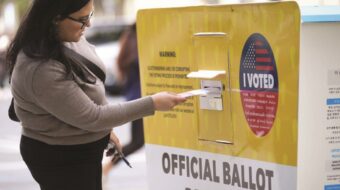
WASHINGTON – Since Congress must start all over again to fix the money troubles at the U.S. Postal Service, it should do so the right way, two postal union leaders told lawmakers. And that doesn’t mean eliminating all Saturday pickups and deliveries or firing thousands of workers, they add.
Instead, National Rural Letter Carriers Association (NRLCA) President Jeanette Dwyer and Postal Workers President Cliff Guffey told senators on Feb. 13, it means stopping a $5.5 billion yearly congressional mandate that USPS prepay future retirees’ health care costs. And it means returning billions the agency overpaid for workers’ pensions, and it means letting USPS explore and exploit new lines of business.
The two union leaders laid out those alternatives at a Senate Government Affairs Committee hearing on the USPS’ financial woes and how to solve them. With the start of a new Congress, drafting a law to solve the service’s deficit must begin anew.
The hearing was dominated by Postmaster General Patrick Donahoe’s scheme to cut an annual deficit he estimates could hit $20 billion, up from $15.9 billion last year. He wants to kill all Saturday pickups and deliveries, except for parcels, for starters.
Donahoe also has said in the past that he wants to fire 100,000 fulltime workers and buy out 100,000 more, numbers he backtracked from at the hearing. And he would reduce – but not eliminate-the health care prepayment, while switching remaining USPS workers to what he claims would be cheap agency-run health insurance.
And Donahoe had no plans for getting USPS into new lines of business to replace first-class mail volume – which is still profitable – lost to the Internet.
All of that drew fire from both the Senate committee’s Democratic majority and from the union leaders. The GOP sided with Donahoe. A third union leader, Letter Carriers President Fredric Rolando, also sharply criticized Donahoe’s schemes.
The senators noted Congress for decades has mandated six-day-a-week delivery. But that mandate isn’t in the temporary money bill that keeps the government going through March 27, so Donahoe used that gap to order Saturday service to end Aug. 5.
Lawmakers ranging from Senate Government Affairs Committee Chairman Tom Carper, D-Del., to Rep. Gerald Connolly, D-Va. – whose district includes thousands of USPS employees – disputed Donahoe’s legal right to kill Saturday service. Several, led by pro-worker Sen. Bernie Sanders, Ind.-Vt., introduced a bill to restore the 6-day rule.
The union leaders argued for other ways to solve USPS’ financial woes, and called Donahoe’s legal reasoning flawed and his dollar savings not justified by data.
Donahoe estimated killing Saturday service would save $2 billion and let the USPS eliminate the equivalent of 22,500 full-time jobs, by reducing overtime. Dwyer retorted USPS’ own study shows killing Saturday service would save $2 billion in spending – and cost $5.2 billion in revenues. Job losses would be double, she said.
“Mr. Chairman, I can tell you the Postmaster General was dead wrong when he stood up at his press conference and said he talked with letter carriers and they support the move to five-day delivery,” Dwyer told Carper. “I am a rural letter carrier and have spoken with many others across the country. I can assure you rural letter carriers do not support elimination of Saturday delivery. Every year at our national convention a resolution is confirmed which says NRLCA will support delivery of mail six days a week.
“The Postal Service can ill-afford to eliminate a day of mail delivery, and there is great debate about how much money it might save by reducing service,” she continued. “NRLCA firmly believes any savings by reducing delivery days will be offset by the lost revenue…when consumers and businesses flock to the Postal Service’s competitors.”
The Postal Service’s own study, she said, “concluded that service cuts” on Saturday “resulting in a 7.7 percent reduction in mail volume would result in a revenue loss of $5.2 billion, in the first year alone…Reducing service now will mean less market share and a more uncertain future.
“And then there are the jobs. When unemployment hovers at 7.8 percent, this is no time for massive layoffs,” she added. Donahoe “grossly and recklessly underestimated the number of jobs lost” as 22,500. “NRLCA alone would lose approximately 20,000 jobs if service were reduced…The jobs the Postal Service is planning to eliminate are good middle-class jobs that will affect mainly minorities, women, and veterans.”
The Letter Carriers’ Rolando also trashed Donahoe’s brainstorms and his legal reasoning. NALC and the Mail Handlers, a sector of the Laborers, represent USPS employees, along with the Rural Letter Carriers and Guffey’s union, the Postal Workers.
“Donahoe’s effort to justify to lawmakers his attempt to do an end-run around Congress by ending Saturday delivery failed badly,” Rolando said. “Donahoe acknowledged he had not studied the impact on lost mail volume and revenue of going to a five-day delivery schedule, and that his figure of $2 billion in potential savings was only an estimate. That estimate lacks credibility because his previous estimates have been found to be wildly inflated by, among others, the Postal Regulatory Commission – in part because they don’t reflect the lost mail volume that would result.”
Photo: NALC Facebook page












Comments